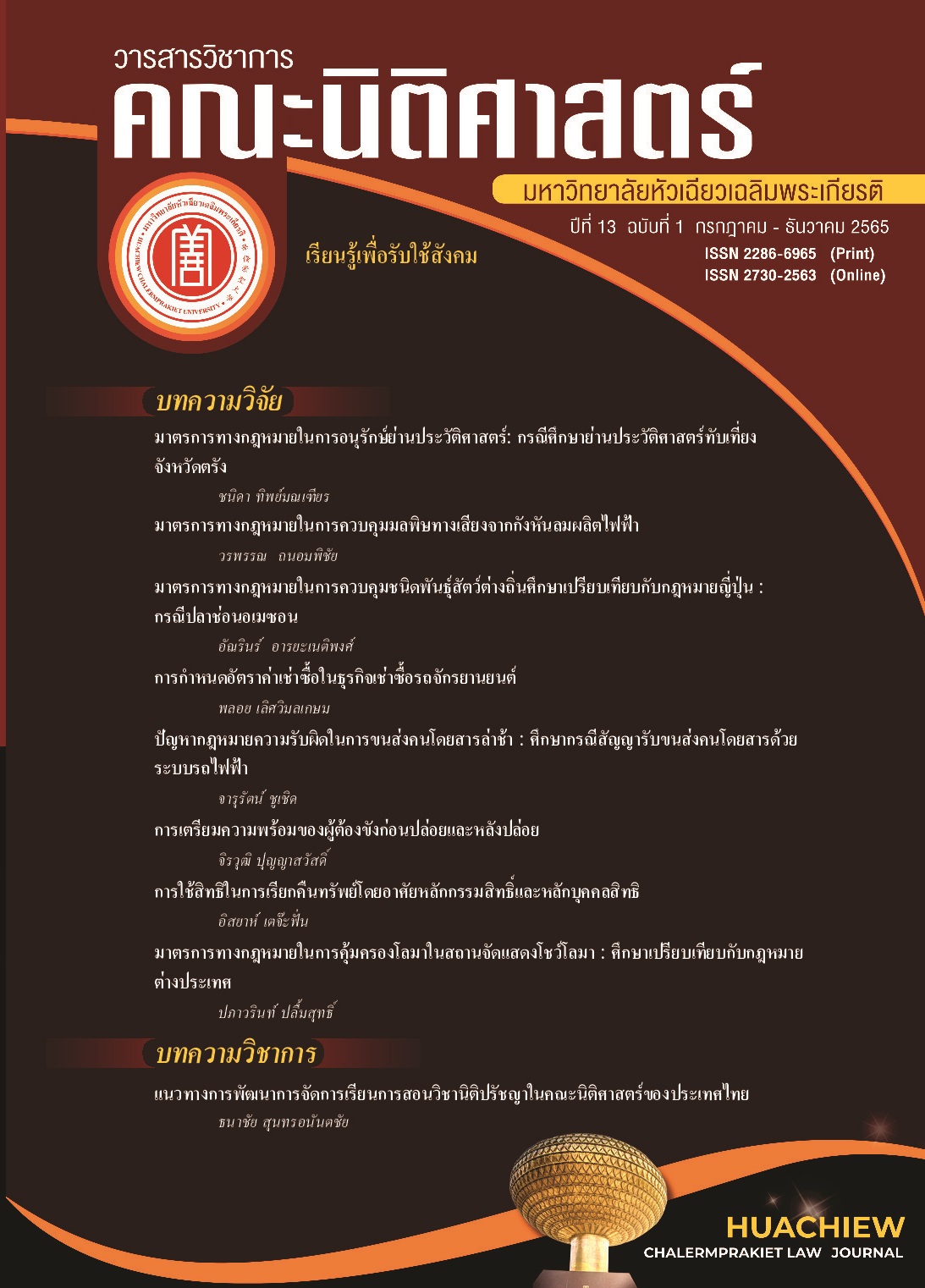Legal problems on delayed carriage of passengers A study on a contract of carriage of passengers by elevated train
Keywords:
Carriage of passengers, elevated train, DelayedAbstract
In this present day, public transport by elevated train is a popular mode of transportation and plays an important role for commuters in the Bangkok area. Since the rail transportation system has its own route separated from the road surface, people can avoid traffic congestion in the city, giving them convenience, speed, and saving travel time. However when there are obstacles in the elevated train service, it can cause delays and damage to people. Transportation of passengers by the elevated train system in Thailand still has problems with measures to compensate for damages caused by delays in many aspects, such as legal measures, measures from the public and private sectors and measures issued by electric train companies.
Based on the study of laws and measures to remedy the damage from delays in electric train service in England, it was found that Mass transit service, mass transit rail system or electric train in England are characterized by private concession for the private sector to operate the passenger transport business by electric train system. Each private owner owns their own trains and the state owns all the rail routes in operation. Therefore, there is competition between private companies that provide service providers, effecting service providers to always maintain or increase service standards, especially measures to compensate for damages to service users if there is a delay in order to provide incentives to enter into a contract of carriage or use the services of that company. British legal measures apply consumer protection laws to such cases. In addition, the government has a policy to encourage business operators to raise the standard of service by campaigning for better remedy measures. Moreover, in the UK there is a central contract on the conditions of electric train travel called “National Rail Conditions of Travel” which specifies the rights and duties of both the service user and the service provider. It set out the minimum level of rights that the consumers are entitled to expect including the matter of redress measures for damages caused by delay. It is a contract that all electric train companies must be bound by and there is a provision forbidding the company to operate the vehicle except for liability otherwise or limit their liability to less than those specified in the central contract. This allows England to have a certain standard for traveling with the electric train system.
However, when studying the laws and various measures related to remedying the damage of train service users in the case of delay, it was found that in Thailand there is only one private company that has been granted a concession to operate the train operation. As a result, there is no competition between companies in determining measures to increase service efficiency and remedy in case of delay. Thailand has consumer protection laws which can be applied to such cases as in other countries. But with the time and method of legal claims taking a long time, it is not appropriate to be used to solve such cases. The author has therefore studied and suggested measures that are appropriate for Thailand in order for the train service users to be reimbursed faster and with a standardized option, such as the issuance of a central contract relating to the elevated train operation arising from the cooperation of both the public and private sectors that have agreed to determine measures to compensate for the damage caused by the delay in order to continue to standardize the use of the elevated train as well as encouraging the government to campaign on the policy of returning the fare to the damaged passenger. By studying the laws and measures of England that the author has observed in this thesis.
However, if there is a solution to the problem as suggested. This will create a standard in the elevated train service business that exists or is going to happen in Thailand in the future.
References
ธานิศ เกศวพิทักษ์, คําอธิบายกฎหมายวิธีพิจารณาคดีผู้บริโภคตามพระราชบัญญัติวิธีพิจารณาคดีผู้บริโภค
(กรุงเทพมหานคร: Pholsiam Printing and Publishing, พิมพ์ครั้งที่ 2, 2551).
ฉัฐญา จันทร์แก้ว, “ข้อสัญญาที่ไม่เป็นธรรมในธุรกิจแฟรนไชส์” (2562) 9:2 วารสารคณะนิติศาสตร์ หัวเฉียวเฉลิมพระเกียรติ.
ไอที24ชั่วโมง, รถไฟฟ้า BTS ประกาศมาตรการเยียวยาผู้โดยสารที่ได้รับผลกระทบจากรถไฟฟ้าขัดข้อง
(19 พฤศจิกายน 2564) https://it24hrs.com <https://www.it24hrs.com/2018/bts-skytrain-fix-problem-for-passenger/>
Department for Transport, Consumer Rights Act 2015 application to transport services (15 Dec 2020) www.gov.uk/dft <https://assets.publishing.service.gov.uk/government/uploads/system/uploads/ attachment_data/file/550780/consumer-rights-act-2015-application-to-transport-services.pdf>.
Department for Transport, Rail Delays and Compensations 2020 (11 Dec 2020) www.gov.uk/dft
<https://assets.publishing.service.gov.uk/government/uploads/system/uploads/attachment_data
/file/927876/rail-delays-and-compensation-report-2020.pdf>.
Office of Rail and Road, Consultation on improving access to delay compensation (11 Dec 2020) https://orr.gov.uk <https://www.orr.gov.uk/sites/default/files/om/consultation-on-improving-
access-to-delay-compensation.pdf>.
Transport for London, Overground and TfL Rail delays (23 Nov 2020) https://tfl.gov.uk
<https://tfl.gov.uk/fares/refunds-and-replacements/overground-and-tfl-rail-delays>.
Downloads
Published
How to Cite
Issue
Section
License
Copyright (c) 2022 Huachiew Chalermprakiet Law Journal

This work is licensed under a Creative Commons Attribution-NonCommercial-NoDerivatives 4.0 International License.
บทความหรือข้อความคิดเห็นใด ๆ ที่ปรากฏในวารสารฉบับนี้เป็นวรรณกรรมของผู้เขียนโดยเฉพาะ คณะนิติศาสตร์มหาวิทยาลัยหัวเฉียวเฉลิมพระเกียรติ และกองบรรณาธิการไม่มีส่วนรับผิดชอบหรือไม่จำเป็นต้องเห็นด้วยกับข้อคิดเห็นนั้น แต่ประการใด








